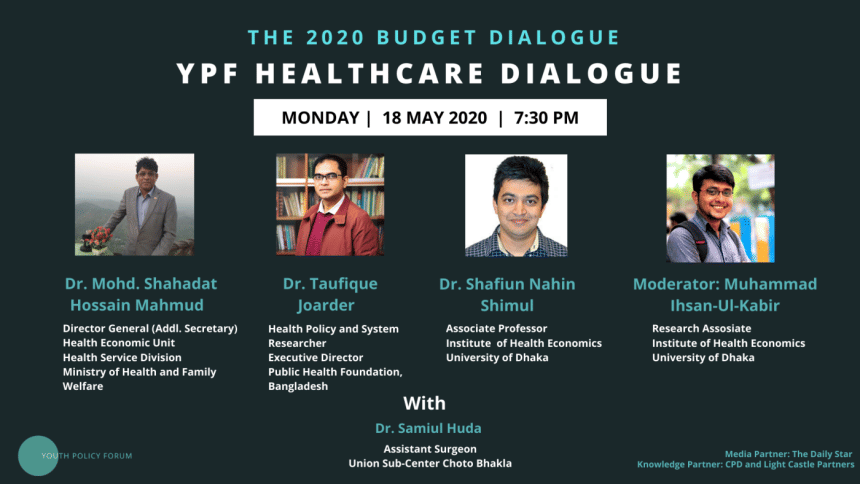Budget dialogue: An exploration into Bangladesh’s healthcare system

The budget dialogue is a webinar series organised by the Youth Policy Forum (YPF) to analyse Bangladesh's upcoming national budget with field experts and policy teams and for their first discussion, they covered the healthcare sector.
The webinar took place on May 18 where panelists included Dr Mohammad Shahadat Hossain Mahmud, Dr Taufique Joarder, Dr Shafiun Nahin Shimul, Syed Yusuf Saadat, and MP Saber Hossain Chowdhury; and moderators Muhammad Ihsan-Ul-Kabir and Dr Samiul Huda.
The healthcare sector is currently on everyone's mind as the world combats the coronavirus pandemic. This virus has exposed multiple pre-existing inefficiencies in our healthcare system. The upcoming budget will not only have to tackle the current healthcare hiccups but also counter the setbacks caused by the pandemic.
The policy team's research showed that there is a weak referral and transfer system and lack of monitoring mechanisms which will need to be decentralised across the country.
The post-pandemic monetary investment is Tk 1537 per capita. The per capita total health expenditure has seen some gradual improvements -- from USD 16 per capita in 2007 to USD 37 per capita in 2015 --but there is rising out-of-pocket costs (currently 72 percent of all health expenses) and catastrophic health expenditures. The budget for the health expenditure must adjust for inflation rates and increase overall health expenditure to align with Sustainable Development Goals.
Effective, accountable allocation of resources is necessary for greater health outcomes. Corruption, monitoring of license renewal, and regulation of tobacco products must be addressed.
When discussing health limitations of universal and social health coverage, the moderator recommended group health insurance as a potential solution to reduce out-of-pocket payments and increase staff health insurance practices. Modernisation of insurance institutions and further research for the area can promote awareness and practice.
The presentation shed light on four specific areas: non-communicable diseases (NCDs), pharmaceuticals, disability care, and mental health. As NCDs, contribute to 59 percent of total deaths in the country, it has a greater health burden than communicable diseases. The budget must be reformed to fund preventative diseases and continuous care is required to tackle NCDs in the population. Recommendations towards the pharmaceutical industry included higher government regulations, such as greater authority over drug price fixing to reduce health expenditure, and further technological incorporations.
As people with disabilities belong to some of the lowest income brackets of the country, the budget was recommended to accommodate both basic and medical needs for people with disabilities and ensure greater health equity.
As psychological stresses continue to pound us during the pandemic, mental health provision should be expanded to district-level facilities and upazila health complexes. Preventative and community-based services, technical support, and anti-stigma campaigns should also be enhanced.
Emergency preparedness, with a focus on Covid-19, was a key element in the dialogue. The moderator suggested a revision of the emergency funds for rapid access and allocating funds towards capacity building. The formulation of a rapid pandemic response team, led by health professionals, can tackle future outbreaks more effectively. Regarding the ongoing crisis, the government has been asked to start developing infrastructure for local vaccine production or to create a fund for foreign vaccine.
During the panel discussion, the private healthcare sector, which provides 87 percent of total care, was addressed by a panelist and incentive-based regulations implemented on the private sector was recommended.
A major issue addressed by all panelists was the regulation of the tobacco industry and its products. Public health cannot be addressed without tobacco control in Bangladesh. The investments and cost from tobacco-related deaths far exceed the revenues from the industry. A tobacco tax reform must be implemented and the tobacco revenue burden cannot fall on consumers.
Panelists also said that government facilities cannot single-handedly tackle the situation. The private sector will need to be involved in Covid-19 testing and patient handling; and that upcoming budget should account for Covid-19 related burdens for the next two years.
The webinar can be viewed on YPF's Facebook page. Tune into the second dialogue of the series about agriculture and food from their page on May 22 at 7:30pm.

 For all latest news, follow The Daily Star's Google News channel.
For all latest news, follow The Daily Star's Google News channel. 



Comments